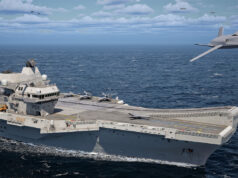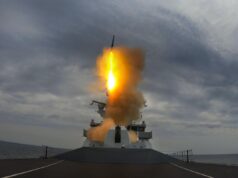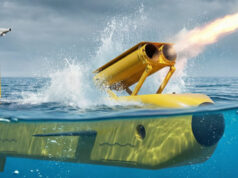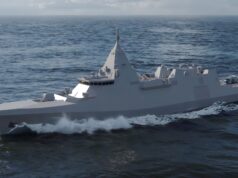A recent research briefing from the House of Commons Library has revealed new details about the UK’s ongoing programme to replace its nuclear warhead.
The programme, which is currently in its concept phase, aims to ensure the UK’s nuclear deterrent remains effective beyond the life of the current system.
The replacement warhead programme was confirmed by the government in February 2020, following a disclosure by a US official. Since gaining Cabinet Office approval of its Strategic Outline Case in September 2021, the programme has moved forward in its early stages.
The concept phase is crucial as it examines the feasibility of different procurement options and identifies performance, cost, and time parameters.
The House of Commons Library briefing notes, “The Concept phase is an opportunity to examine the feasibility of different procurement options and to identify performance, cost, and time parameters for the programme.â€
Estimating the costs of the replacement warhead programme remains challenging. The 2006 White Paper suggested that the cost would be between £2-3 billion, equivalent to £2.8-£4.3 billion in 2022/23 prices.
However, precise cost estimates are not yet available due to the evolving design requirements.
The MOD has indicated, “Given that the Replacement Warhead Programme is still in its early stages, it is too early to provide cost estimates… as much will depend on the eventual design requirements.†So far, £127 million has been spent on preliminary work up to March 2021.
Several factors are expected to influence long-term cost estimates, including the complexity of the programme, commercial arrangements, and collaboration with the United States and its W93 programme. The MOD confirmed in March 2023 that work is underway to agree on cost estimates and funding arrangements, suggesting independent management of the programme from the Nuclear Warhead Capability Sustainment Programme (NWCSP).
The new Labour government has announced a multi-year spending review set to conclude in Spring 2025. This review, alongside a new strategic defence review to report in the first half of 2025, will consider the efficiency and effectiveness of the nuclear programme.
Since 2006, the UK has been working on programmes to maintain its nuclear deterrent, including the development of the Dreadnought-class ballistic missile submarines, expected to enter service in the early 2030s. The decision to replace the Mk4/A nuclear warhead was initially deferred in 2010 but confirmed as part of the Government’s Integrated Defence and Security Review in 2021.
The February 2020 disclosure by a US official about the UK’s replacement warhead programme led to the government’s confirmation of the programme, which was criticized for its lack of transparency and parliamentary scrutiny.
For more details, the full report “Replacing the UK’s nuclear deterrent: The Warhead Programme” is available on the House of Commons Library website.
At the UK Defence Journal, we aim to deliver accurate and timely news on defence matters. We rely on the support of readers like you to maintain our independence and high-quality journalism. Please consider making a one-off donation to help us continue our work. Click here to donate. Thank you for your support!













What a load of waffle. When I read the headline asking the question, I thought it was worth a read.
Dithering projects often fall victim to the treasury axe and this has all the hallmarks of such a project. Ditherers of the past:- Warrior upgrade, Nimrod MK2, HS2 North, Challenger 2 improvement programme, the latter did not get axed but the final numbers were disappointing.
But the RN and defence do take CASD and all the other bits seriously.
Rest of the stiff. Not much so
The US agreed to move forward its warhead replacement program to better fit in with the UK schedule.
A cost of just £2-4 billion to replace all the UK nuclear weapons for several decades seems like a bargain. Given how cheap they are we should consider going up to 500 or 600 to act as true deterrent to Russia even without the US.
Erm, to launch from what exactly ?
How about a nice big Trebuchet ?
A nuclear weapon launched that way is completely impervious to jamming or ABMs and if we use up-cycled wood it would be environmentally friendly.
Jim can volunteer to use it (just don’t mention the range and blast radius).
ðŸ˜
Nice one! 😂
Always volunteers for a good report
Our current total of 64 Tridents could hold 512. Even the reduced max. load of the Dreadnaughts will be 384. Given a few tacticle options 500 is very reasonable.
Yes, on paper but actually just one boat is normally out there and it’s widely understood to carry way less warheads than designed to do, on a good day there might be 2 V’s out at the same time so my question is still valid.
It might surprise you to know that we don’t take the warheads off every time the boat comes back. So to fully arm all our current tridents we need about 500.
OK, can you post the link that backs up what you just stated on here please ? I think you won’t because it’s not true. Only one V class is out there all the time, maybe you should try buying a calculator, then try looking up the UK’s stock of warheads and how each V Boat is maintained and rotated. Let me know what you find out. Sorry but on this subject you are thrashing about in shallow waters with nothing to save you.
The RN version of SSN-A may well have the capability of launching tactical nukes via VPM. Whether it is utilized would be an entirely separate UK political and funding issue. Similarly, it is conceivable the RAF could acquire a limited number of F-35A, which are dual certified as of Jan 24 to carry the NATO designated inventory of B-61s. GCAP/Tempest would presumably be another future option. Unfortunately, given the current geopolitical environment, many knowledgeable sources are pessimistic re continuing nuclear arms control treaties, post 2026. There may well be a subsequent multi-party arms race. Not totally implausible to speculate that an organization w/in HMG/MoD has been tasked w/ planning for that scenario. 🤔
Four submarines, times 12 missiles per submarine, times ten independent re entry war heads per missile comes to 480. Plus spares for going through regular overhaul-remanufacture. Probably need around 120 for this process so a total of 600 with upto 480 usable sounds feasible.
In principle you can put up to 12 MIRVs on a single D5. Then restoring our tactical nuclear arsenal on top of that (i.e conventional delivery systems) would give us some extra rungs on the escalation ladder. It all enhances credibility.
I agree with Jim, 2-4billion is an absolute bargain, especially considering that this is the main deterrent that Russia is banking we dismantle. If anything we should up increase output, that would really put the cat amongst the Russian pigeons.
Would appear that an effort to both upgrade/modernize and increase warhead inventory would be a prudent measure to undertake in the current threat climate. The announced stockpile will be ~260 warheads. It is not an unreasonable plan, given Orc holdings of 5000+ warheads. And, oh yeah, a probable ChiCom plan to triple their warhead count by 2035.
Having a stockpile of that quantity sort of doesn’t make any sense unless you have the capability to send them. A single V boat is normally all the UK has to deliver them via Trident, we no longer have air launched weapons so unless the V boat can re arm both Missiles and Warheads a fair few times, I see little point in spending all that money.
Most of the USA and Russia’s active nuclear weapons are also on submarines and it may surprise you to learn that Russian and American submarines don’t spend 100% of their time at sea.
All SLBM systems will have between 1/3rd and 1/4 of their warheads at sea just like ours.
There are also plans for all SSBN’s to launch from the dock however it’s highly unlikely an SSBN at the dock would survive long in a nuclear exchange.
If launching from any bastion or littoral area is a viable future option, it would certainly present a formidable rationale for the development of an impressive GBAD ABM capability. 🤔
Deep, if you are available, would appreciate a second opinion re launches outside designated patrol area in extremis. Have significant doubt re viability. 🤔
Given its small size the UK lacks bastions or any where like Wyoming to act as a missile sponge. However its small dense size could work out well for it under ABM capability much like Israel. It would be relatively easy to cover the entire UK with an ABM system unlike say the US or Russia that’s much more spread out.
It’s a system I believe we should double down on irrespective of cost as MAD is not likely to continue working as it did in the Cold War.
It’s also difficult for the UK given our limited size to have bastions in the way that the Russians can in the north. If submarine detection becomes possible via satellite then our CASD won’t be the deterrent it currently is and it may be better to invest heavily in missile defence.
Why do you respond in such a condescending manner ? I’m just answering your ill thought out comments with actual facts. Stop with the silly stuff, it only makes you look a bit daft.
Please refer to post above for possible additional options.
I have, and there are none. Please tell me/us what the UK have ?
As stated in the previous post, UK has committed to develop SSN-A, which will incorporate some variant of the Virginia Payload Module (VPM). Submarine Launched Cruise Missile–Nuclear (SLCM-N) will be designed to launch from SSN VPMs. Would fully anticipate UK will be offered an opportunity to purchase SLCM-N by the US.
F-35A purchase by RAF would enable UK deployment/delivery of a portion of the existing NATO B-61 stockpile.
GCAP/Tempest could readily be developed as a dual certified a/c.
Not certain how to explain this concept more clearly. Specific questions?
Yes, the US may soon be at a disadvantage given that it must have sufficient weapons to take on both China and Russia in a nuclear exchange. China is building ICBM fields no doubt to act as a missile sponge for US weapons. If Britain increased its warhead count to the maximum it could sustain on its current missiles then they would give the combined NATO counter force strike and increase of 50% based on the 1000 or so warheads the US currently deploys on trident submarines.
The UK is not subject to any nuclear arms limitations treaties unlike the USA so could bypass this problem.
Yes, precisely. Events could become very sporting and potentially quite messy at any time post 2026.
Utter Tosh.
Sorry but I once used to agree with most of your stuff, not now though, You seem not to have a clue about the actual reality of the capability of the UK to launch 500 Nuclear warheads at this particular time. I see that you have a fellow poster baking up your claims who has the same lack of knowledge too. I’m smelling a rat TBH.
Facts are these, We might have 4 V class boats, each with 16 tubes, each with the capability to launch up to 14 warheads, that equates to 224 which funny enough makes the current 250 or so look realistic. If you think that each boat will still be carrying a full load even in deep maintenance then I’m sorry but you really do need to have a word with yourself.
Four minus one in deep maintenance leaves three times 16 times 14 (your figure of war heads per missile) comes to 672 and it would be possible in an emergency to put three vessels to sea at one time. France did it within the last three years with only four vessels. Clearly we can’t launch that many as we don’t have that many but the point made by others which you have consistently argued against was not what we can do now but what we should aim for in the future.
Ummm…er…in the interest of full disclosure, believe your cost estimate may be significantly understated, especially if a secondary delivery system is added to the inventory (e.g. F-35A, GCAP/Tempest, SSN-A mod, etc.) Not an impossible amount, however, not chump change either.
I’m only advocating we increase our warheads so that we have all our trident missiles fully armed which is around 500 ish so the cost should be limited to simply buying twice as many warheads as currently planned.
But we would double our nuclear capability and add substantially to NATO’s combined counter force given the US has relatively few warheads on its Trident submarines.
The US is covered by treaty on this but the UK is not. Seems like a pretty cheap and simple interim plan to me.
How deep is the RN nuclear security fubar run? 😳 There has to be an awful lot of red faces n shitty pants doing the headless chicken. We may never know. Unless of course you’re from Belarus. 🤬🕳ï¸Btth